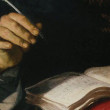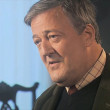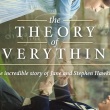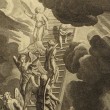Love, Tolerance, and the Making of Distinctions
by Bishop Robert Barron
Filed under Man

I recently wrote a piece on Bruce Jenner’s transformation into Caitlyn Jenner. I argued that the manner in which Jenner spoke of his transition reflected a Gnostic anthropology, which is repugnant to a Biblical view of the human being. I didn’t say a word about Jenner personally; I urged no violence against him/her; I didn’t question his/her motives. I simply made an observation that the moral and spiritual context for transgenderism is, from a classically Christian standpoint, problematic. Not... Read More
“The Avengers” and Friedrich Nietzsche
by Bishop Robert Barron
Filed under Movies/TV

C.S. Lewis, J.R.R. Tolkien, and their colleagues in the Inklings wanted to write fiction that would effectively “evangelize the imagination,” accustoming the minds, especially of young people, to the hearing of the Christian Gospel. Accordingly, Tolkien’s Gandalf is a figure of Jesus the prophet and Lewis’s Aslan a representation of Christ as both sacrificial victim and victorious king. Happily, the film versions of both The Lord of the Rings and The Chronicles of Narnia have proven to be... Read More
Stephen Fry, Job, and the Cross of Jesus
by Bishop Robert Barron
Filed under The Problem of Evil

The British writer, actor, and comedian Stephen Fry is featured in a YouTube video which has gone viral: over 5 million views as of this moment. As you may know, Fry is, like his British counterparts Christopher Hitchens and Richard Dawkins, a fairly ferocious atheist, who has made a name for himself in recent years as a very public debunker of all things religious. In the video in question, he articulates precisely what he would say to God if, upon arriving at the pearly gates, he... Read More
Why Having a Heart of Gold is Not What Christianity is About
by Bishop Robert Barron
Filed under Morality, Religion

Many atheists and agnostics today insistently argue that it is altogether possible for non-believers in God to be morally upright. They resent the implication that the denial of God will lead inevitably to complete ethical relativism or nihilism. And they are quick to point out examples of non-religious people who are models of kindness, compassion, justice, etc. In point of fact, a recent article has proposed that non-believers are actually, on average, more morally praiseworthy than religious... Read More
Does Religion Really Have a “Smart-People Problem”?
by Bishop Robert Barron
Filed under New Atheists, Religion

Daniel Dennett, one of the “four horsemen” of contemporary atheism, proposed in 2003 that those who espouse a naturalist, atheist worldview should call themselves “the brights,” thereby distinguishing themselves rather clearly from the dim benighted masses who hold on to supernaturalist convictions. In the wake of Dennett’s suggestion, many atheists have brought forward what they take to be ample evidence that the smartest people in our society do indeed subscribe to anti-theist views.... Read More
The Theory of Everything: A God-Haunted Film
by Bishop Robert Barron
Filed under Atheism, Movies/TV

The great British physicist Stephen Hawking has emerged in recent years as a poster boy for atheism, and his heroic struggles against the ravages of Lou Gehrig’s disease have made him something of a secular saint. The new biopic “The Theory of Everything” does indeed engage in a fair amount of Hawking-hagiography, but it is also, curiously, a God-haunted movie. In one of the opening scenes, the young Hawking meets Jane, his future wife, in a bar and tells her that he is a cosmologist. “What’s... Read More
Revisiting the Argument from Desire
by Bishop Robert Barron
Filed under The Existence of God

One of the classical demonstrations of God’s existence is the so-called argument from desire. It can be stated in a very succinct manner as follows. Every innate or natural desire corresponds to some objective state of affairs that fulfills it. Now we all have an innate or natural desire for ultimate fulfillment, ultimate joy, which nothing in this world can possibly satisfy. Therefore there must exist objectively a supernatural condition that grounds perfect fulfillment and happiness, which people... Read More
Revisiting the Argument from Motion
by Bishop Robert Barron
Filed under The Existence of God

One of the unintended but happy consequences of the emergence of the new atheism is a renewed interest in the classical arguments for God’s existence. Eager to defend the faith that is so vigorously attacked today, Catholic apologists and evangelists have been recovering these rational demonstrations of the truth of God; and the atheists, just as eager to defend their position, have entered into the fray. In the process, these ancient arguments, long thought by many to be obsolete, have found... Read More
Why I Love My Invisible Friend
by Bishop Robert Barron
Filed under God's Nature, The Existence of God

One of the favorite taunts of the New Atheists is that religious people believe in an “invisible friend.” They are implying, of course, that religion is little more than a pathetic exercise in wishful thinking, a reversion to childish patterns of projection and self-protection. It is well past time, they say, for believers to grow up, leave their cherished fantasies behind, and face the real world. In offering this characterization, the New Atheists are showing themselves to be disciples of... Read More
Soft Atheism and Rational Religion
by Bishop Robert Barron
Filed under Atheism

A very instructive exchange between Gary Gutting, a philosophy professor at Notre Dame, and Philip Kitcher, a philosophy professor at Columbia, just appeared in the pages of The New York Times. Kitcher describes himself as a proponent of “soft atheism,” which is to say an atheism distinct from the polemical variety espoused by Richard Dawkins and Christopher Hitchens. Unlike his harsher colleagues, Kitcher is willing to admit that religion can play an ethically useful role in a predominantly... Read More







